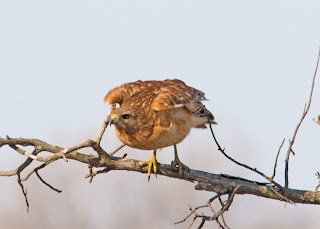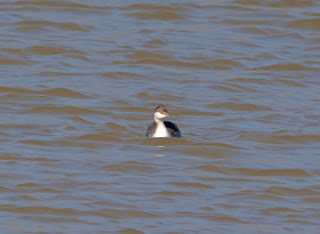Red-shouldered Hawk
Ditto
Ditto
Neotropic Cormorant
Downy Woodpecker
Blue-winged Teal
Gadwall
Gadwall, Position 2
Horned Grebe
Juvenal Great Blue Heron
03-18 and 03-19-17
We're back to spring weather again, as the low pressure system that had once been affecting
the eastern part of the country has moved on. This makes migratory movement get into a
higher gear and bring us more birds that are northbound.
The Red-shouldered Hawk shots are all from today, and I practically walked into the bird before
I noticed it. This gorgeous bird gave me these three shots and he was farther away from me in the first shot, and came closer. These hawks are excellent mousers, and will prefer a mouse over a bird.
This is one of the many species that you'll save if you forgo rat poison.
The Neotropic Cormorant, a warmer weather bird, is rare in these parts, but has given us presence
since at least 2015. February 21 of this year is the earliest that it has been here, and I strongly believe, even without a band, that this is one of last year's juvenal birds, now a pristine adult in breeding plumage.
Many Downy Woodpeckers were showing themselves today, and this one happened to be cavorting
with a female, also in the area. Try as I might, was unable to get a shot with the two of them together.
The Blue-winged Teal were not on the lake, but they were the only ones in the area. They were found at the creek, spending a little extra time foraging before they go to their breeding grounds.
A lone Gadwall was in the company of the teal, and was still there when I quietly left the area. None of them had any idea that I was in their presence, as it should be.
This Great Blue Heron is a beautiful example of one of last year's crop born here at Boomer Creek.
This bird is definitely a first year bird, due to its gray coloring. A 5-year bird will have black epaulettes and tan shorts. Due to their coloring, it is easy to age them.
This lone Horned Grebe was located near Goose Island in the area of the geese.










No comments:
Post a Comment